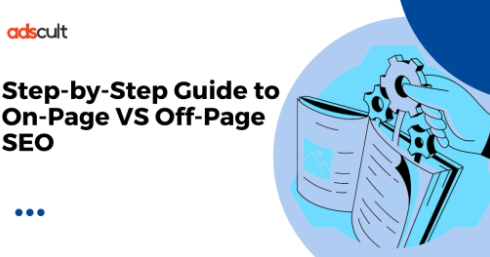Your knowledge of SEO, or search engine optimization as it is more widely known, is vital if you have experience in digital marketing. Simply put, search engine optimization (SEO) is all about increasing your website’s online visibility, establishing the legitimacy and authority of your site, and growing brand awareness, all of which aid in increasing organic traffic and revenue.
But, as time passed, Google modified its SEO guidelines, making ranking harder. Utilizing technical, off-page, and on-page SEO strategies, SEO procedures make sure your website appears at the top of search results. Below, we’ve included a brief explanation of technical SEO and an in-depth review of on-page and off-page SEO tactics.
If you find that improving your SEO results requires much time and expertise, you can hire an SEO company to help you. SEO providers have everything you need on-page, off-page, or technical website optimization. Partner with businesses like Adscult, the top SEO agency in Mumbai that can deliver better results and have honest user feedback. Three major categories can be used to classify different forms of SEO. The three types of SEO optimization are technical, off-page, and on-page.
What is On-Page SEO and How Do You Use It?
Everything you can do on your website to ensure that your pages appear on search engine results pages (SERPs) is known as on-page search engine optimization. It also helps with assessing the ranking of your web pages. How does it operate? It makes your pages appear better to visitors and search engines by utilizing content and other technical components. In search results, it will rank better the more pages you optimize. More people will visit your website as a result. The following is a discussion of on-page SEO strategies:
Keywords Research:
It is also a widely used phrase. That may be something you’ve heard numerous times already. Conducting in-depth keyword research is the initial step toward performing advanced on-page SEO for your website. SEO tools such as Ahrefs, Google Keyword Planner, Semrush, and others can help you quickly determine the keywords and phrases people interested in your business will likely search for. These tools will provide you a thorough understanding of the number of individuals looking for a particular keyword and the keywords your rivals are utilizing in the content of their websites.
Original Content Creation:
When it comes to search engine optimization, content is the only option. Producing informative, engaging, and high-quality content is essential for keeping visitors on your website and for search engines to rank your website highly. In addition, begin crafting lengthier, more comprehensive articles that address the subject matter in detail to build credibility
Title Tags and Meta Descriptions Optimization:
To encourage readers to click on your content, ensure your title tag and meta description are as detailed as possible without exceeding the allowed character limit. Stay under 60 characters for your title tag and 160 for your meta description. If you write more than this restriction, you risk having your title and meta description appear partially on Google. Remember to include your target term to improve relevancy and raise your click-through rate.
Heading Tags and Content Structure:
Use heading tags like “H1,” “H2,” or “H3” to arrange your information so that it’s easier for visitors to locate what they’re looking for. This will help ensure that your content is readable by humans and search engines. Target keywords are another option for the headers. Nonetheless, try to maintain a natural flow to your writing. Leave the header alone if it detracts from the primary content’s appearance. Avoid using the buzzwords excessively.
Internal Linking:
You’ve already published a blog post on “the comprehensive guide on off-page SEO techniques.” You are writing a blog post on “How to do SEO?” You can create links between these sites instead of discussing your second blog’s off-page optimization strategies. Post a link to your blog post explaining “off-page SEO techniques” in your “How to do SEO?” section. In this manner, you may refrain from repeatedly giving a detailed explanation of each off-page SEO strategy. In summary, internal linking facilitates the distribution of authority throughout your website, improves user experience, and encourages readers to delve deeper into your material.
What is Off-Page SEO and How Does It Work?
Everything you do outside your website to improve its search engine ranking and drive more traffic and engagement is known as off-page SEO. Building high-quality backlinks from reputable websites, leveraging social media to increase brand recognition, and cultivating your online reputation by obtaining brand mentions through influencer partnerships are a few examples of what it entails. Off-page SEO raises your website’s search engine ranking and increases organic traffic by signaling search engines that your website is trustworthy, significant, and authoritative.
Building Backlinks:
Getting high-quality links to your website from trustworthy websites is the main objective of off-page SEO. By following these links, search engines can tell how valuable and credible your material is. Recall that interacting with spammy websites when building links can reduce your website’s authority. Engage with sites that are highly authoritative and pertinent to your topic at all times. You also need to consider the number of different domains or referring domains that point to your website, If most of your backlinks come from the same domain, you will gain less clout in that topic than you would if you had backlinks from more authoritative and relevant domains.
Content Marketing:
One of the most effective ways to obtain backlinks for any off-page SEO service is through content marketing. Having well-written, engaging, and current information makes it simple to capture readers’ attention. Due to other people’s perception of your value addition to their own stories, this attention frequently results in organic backlinks. The secret is to create genuinely captivating and problem-solving material. When you concentrate on the problems your target audience faces and devise original solutions—for example, by producing interactive content and visual assets like infographics, blog articles, etc. You establish yourself as a trustworthy source that links naturally. To get backlinks, cooperate with webmasters, bloggers, and business titans.
Local SEO & Citation Sites:
Citation sites and local SEO are essential for increasing off-page SEO. Local search engine optimization (SEO) is crucial for businesses looking to connect with local customers because it ensures your website appears for local queries. Business directories, sometimes called citation sites, are internet directories where you can add your location, services, and contact details. Because they assist search engines view your website as more authoritative, reliable, and relevant, these listings are essential for off-page SEO. This is helpful for local searches since it increases credibility and trusts with search engines. Your chances of ranking highly in local search results and attracting more organic visitors to your website increase with the relevant, high-quality citations you receive.
Fundamental Distinctions Between Technical, Off-Page, and On-Page SEO
The term “on-page SEO” describes optimization on your website, such as adding keywords to your main content and technical elements like heading tags, meta descriptions, alt text for images, etc. The optimization of your website using external means, such as content marketing, social network integration, user-generated reviews, backlink building, and local SEO, is known as off-page SEO. The optimization of your website’s technical elements, such as the site map, HTTPS and security, mobile usability, page load speed, and schema markup, is referred to as technical SEO.
Conclusion
Both on and off-the-page SEO is a lengthy process that requires ongoing advancement and improvement. This step-by-step strategy may increase your website’s exposure, attract organic traffic, and ultimately meet your SEO goals. Since SEO is a constantly changing sector, staying current on the newest trends and algorithm changes is critical to sustaining your success online.
Enrolling in our AdsCult program will assist people of all experience levels in mastering digital marketing approaches and strategies, regardless of whether they are seasoned professionals or just starting in this fascinating field. As one the best digital marketing Agency in Mumbai, our program equips participants with the knowledge and skills to thrive in the ever-evolving landscape of online marketing.



 Chat on WhatsApp
Chat on WhatsApp
 Get a Quick Call
Get a Quick Call